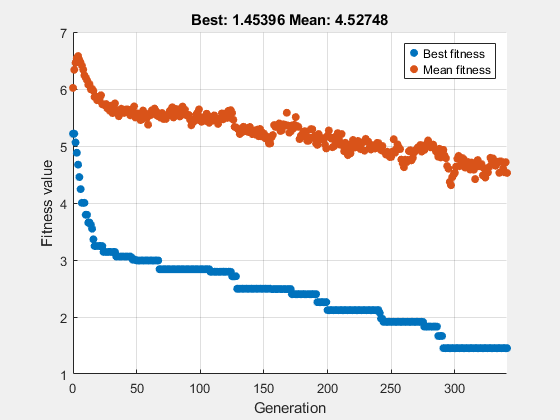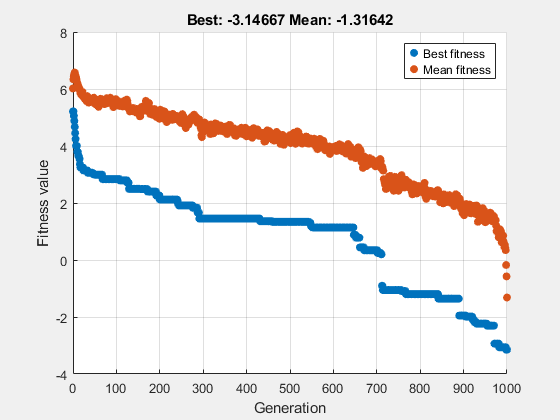최대 세대 수와 정체 세대 수 설정
MaxGenerations 옵션은 유전 알고리즘에서 사용하는 최대 세대 수를 결정합니다. Stopping Conditions for the Algorithm 항목을 참조하십시오. MaxGenerations를 늘리면 최종 결과를 개선할 수 있습니다. 관련 옵션인 MaxStallGenerations는 ga가 몇 스텝에 걸쳐 진척 상황을 검토할지 제어합니다. MaxStallGenerations를 늘리면 알고리즘이 함수 실행을 더 많이 수행하여 더 나은 해를 구해야 할 때 ga가 이를 계속 진행하도록 할 수 있습니다.
예를 들어, 10개 변수와 디폴트 파라미터를 사용하여 rastriginsfcn을 최적화해 보겠습니다. 솔버가 최솟값 0으로 가까워지는 과정을 관찰하기 위해 함수의 로그를 최적화합니다.
rng default % For reproducibility fun = @(x)log(rastriginsfcn(x)); nvar = 10; options = optimoptions('ga','PlotFcn',"gaplotbestf"); [x,fval] = ga(fun,nvar,[],[],[],[],[],[],[],options)
ga stopped because the average change in the fitness value is less than options.FunctionTolerance.

x = 1×10
-0.0495 -0.0670 -0.0485 0.0174 -0.0087 0.0275 -0.0383 0.0620 -1.0047 -0.0298
fval = 1.4540
ga가 원점의 최적점에 근접하면 멈춥니다. 더 나은 해를 얻기 위해 정체 세대 제한을 500으로, 세대 제한을 1,000으로 설정합니다.
options = optimoptions(options,'MaxStallGenerations',500,'MaxGenerations',1000); rng default % For reproducibility [x,fval] = ga(fun,nvar,[],[],[],[],[],[],[],options)
ga stopped because it exceeded options.MaxGenerations.

x = 1×10
0.0025 -0.0039 0.0021 -0.0030 -0.0053 0.0033 0.0080 0.0012 0.0006 0.0088
fval = -3.1467
이번에는 솔버가 실제 최솟값에 훨씬 더 가깝게 근접합니다.